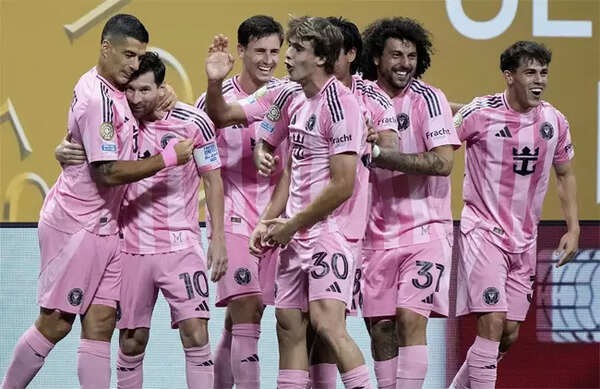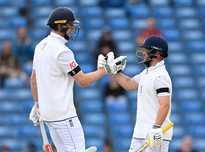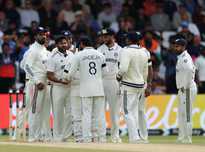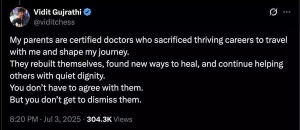The FIFA Club World Cup 2025, in its revamped format, has delivered a series of compelling narratives as it progresses towards the Round of 16. The competition, hosted in the United States, boasts an expanded field of teams, a redesigned trophy, multiple venues, and even the novel addition of referee cams, bringing it closer in scale and scope to the prestigious quadrennial World Cup.
Organizers have framed the tournament as "a celebration of hope, excellence, and pride," uniting clubs, players, and fans through their shared passion for the sport. With numerous debutants and a month-long schedule, the tournament's profile has significantly grown.
Featuring teams from all six confederations – 12 from Europe, 6 from South America, 4 each from Africa, Asia, and North/Central America and the Caribbean, 1 from Oceania, and the host nation's representative – the 2025 edition has been marked by unexpected results, David vs. Goliath clashes, and intense moments both on and off the pitch.

Auckland City, ranked a distant 4,971st in the Opta Power Rankings, entered the Club World Cup as the lowest-ranked team. Drawn into a group with powerhouses Bayern Munich, Benfica, and Boca Juniors, their chances appeared slim. The team, composed of amateurs playing in New Zealand's Northern League, faced a daunting challenge.
Their tournament began with a humbling 0-10 defeat to Bayern Munich, the largest margin of victory thus far, followed by a 0-6 loss to Benfica.
Facing Argentinian giants Boca Juniors in their final match, Auckland City defied expectations. In a true David vs. Goliath encounter, the amateurs held Boca to a 1-1 draw, denying them a crucial spot in the Round of 16. The result, considering the 4,819-point ranking difference, stands as a remarkable achievement for the New Zealand side.

Inter Miami, led by Lionel Messi and bolstered by the additions of Luis Suarez, Jordi Alba, and Sergio Busquets, defied predictions in Group A. Despite being grouped with formidable opponents like Porto, Al Ahly, and Palmeiras, Miami secured a place in the Round of 16, finishing second.
While the Herons managed only one victory, it proved sufficient. Following a draw against Al Ahly, Miami faced Porto. Messi's brilliance, highlighted by a stunning free kick, secured a 2-1 win. A 2-2 draw against Palmeiras sealed their progression to the next stage.
The final matchday in Group E saw tempers flare as River Plate's Marcos Acuna and Inter's Denzel Dumfries nearly came to blows after their match. The animosity, stemming from a previous encounter three years prior, saw Acuna taunt Dumfries with a reminder of Argentina's victory over the Netherlands in the 2022 World Cup quarter-final.
Beyond on-field clashes, extreme heat presented significant challenges. Teams resorted to ice baths and cold towels to mitigate the effects of the heat. Borussia Dortmund even had their substitutes watch the game from the locker room to shield them from the scorching conditions, described by their coach as "sauna-like."
Moreover, US Immigration and Customs Enforcement (ICE) and Customs and Border Protection (CBP) have a visible presence at the tournament, requiring non-citizens to provide proof of legal status to attend matches.
With the 2026 FIFA World Cup, co-hosted by the United States, Mexico, and Canada, less than a year away, the Club World Cup has highlighted several potential issues. Concerns have been raised regarding pitch quality and extreme weather conditions, suggesting challenges that need to be addressed before the global tournament.
Real Madrid's Jude Bellingham criticized the pitch conditions, stating, "The pitches aren’t great here. The pitches aren’t great at all."
Despite the emergence of underdog stories and unexpected results, the tournament remains a stronghold for European giants. Teams like Real Madrid and Manchester City continue to be favorites for the title. In contrast, Seattle Sounders, Urawa Reds, Ulsan, Wydad AC, and Pachuca were eliminated without earning a single point.
Older articles
 Black Caps Announce Packed 2025-26 Home Schedule Featuring Australia, England, West Indies & South Africa
Black Caps Announce Packed 2025-26 Home Schedule Featuring Australia, England, West Indies & South Africa
 Rishabh Pant: Greg Chappell Lauds Indian Star's Game-Changing Cricket Revolution
Rishabh Pant: Greg Chappell Lauds Indian Star's Game-Changing Cricket Revolution
 5 Silent Signals: Spotting Prediabetes Without a Blood Test
5 Silent Signals: Spotting Prediabetes Without a Blood Test
 England Captain Stokes Hails Opening Duo After Stunning Chase Against India
England Captain Stokes Hails Opening Duo After Stunning Chase Against India
 Gambhir Defends India's Lower Order After Test Match Collapse, Cites Dropped Catches as Key Factor
Gambhir Defends India's Lower Order After Test Match Collapse, Cites Dropped Catches as Key Factor
 Samsung Unveils Galaxy A35 5G and A55 5G Pricing, Specs, and Availability
Samsung Unveils Galaxy A35 5G and A55 5G Pricing, Specs, and Availability
 Cummins Lauds Australia's Solid Start in New World Test Championship Campaign
Cummins Lauds Australia's Solid Start in New World Test Championship Campaign
 Science-Backed Strategies: 5 Simple Habits for a Healthier Heart
Science-Backed Strategies: 5 Simple Habits for a Healthier Heart
 Optical Illusion Challenge: Can You Spot the 'Pan' Hidden Among 'Pens' in 10 Seconds?
Optical Illusion Challenge: Can You Spot the 'Pan' Hidden Among 'Pens' in 10 Seconds?
 Chess Grandmaster Vidit Gujrathi Defends Family's Medical Professions After Online Attack
Chess Grandmaster Vidit Gujrathi Defends Family's Medical Professions After Online Attack